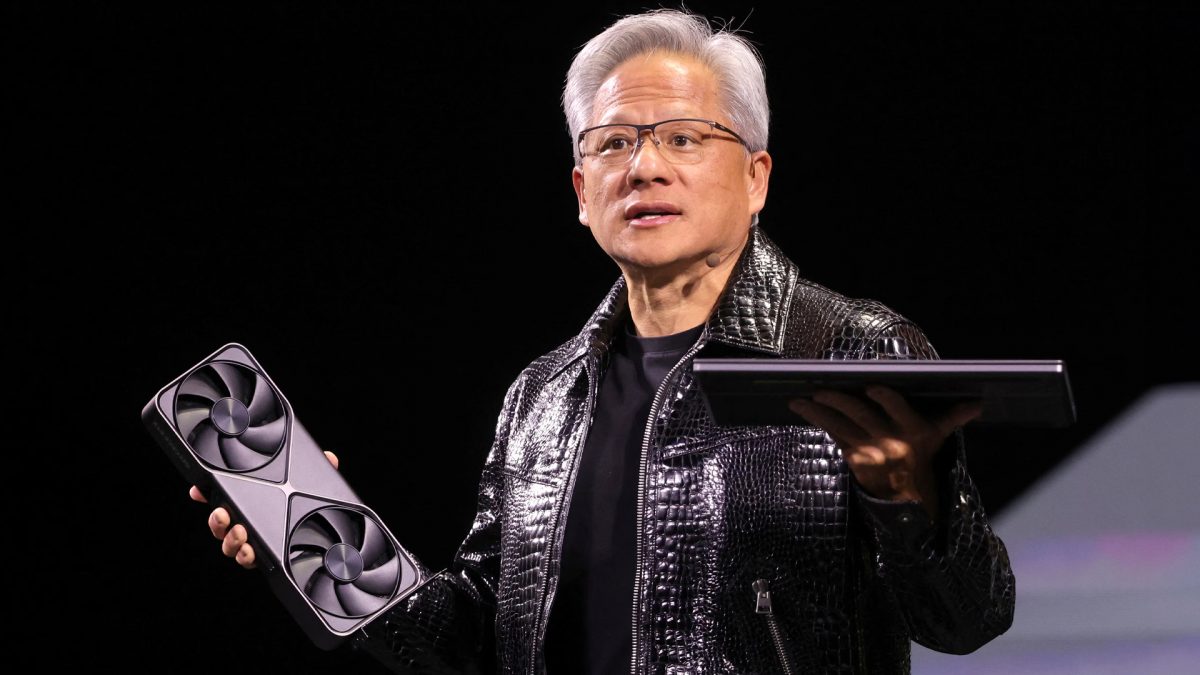Nvidia’s market cap briefly touched $4 trillion this week.
The tech firm led by Jensen Huang became the world’s first company to cross that valuation figure.
It surpassed the GDP of several countries and is nearing the GDP of India.
But what happened exactly? How did Nvidia surpass the GDP of the UK?
Let’s take a closer look:
What happened
The shares of Nvidia on Wall Street gained three per cent on Wednesday.
The shares hit a 52-week high of $164.42 before retreating briefly.
This resulted in its market cap vaulting over $4 trillion.
This took Nvidia’s worth alone more than the GDP of several nations including the UK and France.
For reference, its rivals Microsoft and Apple are valued at around $3.7 trillion and $3.1 trillion respectively.
The company’s shares have been on a tear over the past two years.
In 2025, they are up by 18 per cent, while in 2024 they gained around 25 per cent.
The Nasdaq, meanwhile, is up just around six per cent in 2025.
The company, which has around 35,000 employees, is now more valuable than 97 per cent of the world’s economies..
Just the US ($29.96 trillion), China ($19 trillion), Germany ($4.52 trillion), India ($4.19 trillion) and Japan ($4.2 trillion). have GDPs in excess of Nvidia’s value.
The market cap of Nvidia is more than all of the military spending in the world combined.
The International Institute for Strategic Studies said that countries spent $2.46 trillion on defence in 2024.
Nvidia is worth more than the world’s 30th wealthiest people including Elon Musk and Jeff Bezos.
Why is this happening?
Nvidia scaling new heights shows that Wall Street is continuing to put all its chips in Artificial Intelligence.
“The market has an incredible certainty that AI is the future,” said Steve Sosnick of Interactive Brokers. “Nvidia is certainly the company most positioned to benefit from that gold rush.”
Part of this is due to relief that President Donald Trump has walked back his most draconian tariffs, which pummeled global markets in early April.
Even as Trump has announced new tariff actions in recent days, the S&P 500 and Nasdaq have lingered near records.
“You’ve seen the markets walk us back from a worst-case scenario in terms of tariffs,” said Angelo Zino, technology analyst at CFRA Research.
While Nvidia still faces US export controls to China as well as broader tariff uncertainty, the company’s deal to build AI infrastructure in Saudi Arabia during a Trump state visit in May showed there was also potential upside in Trump’s trade policy.
“We’ve seen the administration using Nvidia chips as a bargaining chip,” Zino said.
Perplexity AI announces Comet browser
The development came on the same day that the Nvidia-backed start-up Perplexity AI announced that it was launching Comet – a new AI-powered web browser.
The browser is said to use AI to autonomously guide user navigation and decision-making.
It allows users to ask questions, perform tasks, and conduct research in a single, unified interface.
The browser integrates a built-in assistant that can compare products, summarize content, book meetings, and transform complex workflows into simple, conversational experiences.
Comet is currently available to subscribers who pay $200 per month for Perplexity Max, with broader access rolling out via invite over the summer.
Nvidia is worth more than the individual GDP s of the UK ($3.38 trillion), Russia ($2 trillion) and France ($3.052 trillion)
Comet has many prominent and high-profile backers including Jeff Bezos and Japan’s legendary investment firm SoftBank.
Nvidia is taking on Google Chrome, the dominant player in the global market which is used by over 3 billion people.
Google’s web browser is said to have cornered a nearly 70 per cent market share – leaving its rivals Microsoft, Firefox and Safari far behind.
Comet stores data locally and avoids model training on personal information—a move likely to appeal to privacy-conscious users.
Last year, OpenAI added a search engine to ChatGPT and recently made the service available to all of its users. Google also introduced an AI-powered search feature, called AI Overviews, last May.
The Sam Altman-led OpenAI is also said to be close to releasing an AI-powered web browser.
OpenAI’s browser is designed to keep some user interactions within a ChatGPT-like native chat interface instead of clicking through to websites, two of the sources said.
The browser is part of a broader strategy by OpenAI to weave its services across the personal and work lives of consumers, one of the sources said.
A web browser would allow OpenAI to directly integrate its AI agent products such as Operator into the browsing experience, enabling the browser to carry out tasks on behalf of the user.
With inputs from agencies


)

)
)
)
)
)
)
)
)



